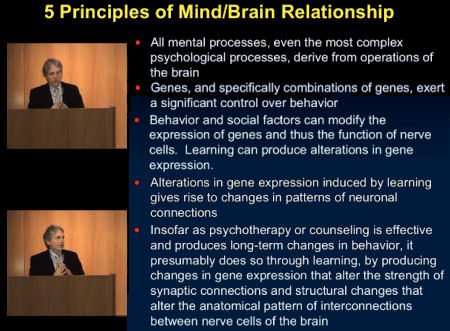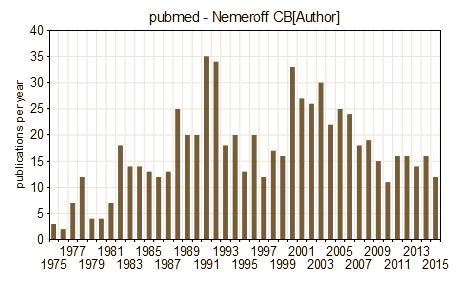special to the Miami Heraldby Dr. Charles NemeroffNovember 23, 2015Depression is a commonly used and terribly misunderstood term. When mental health professionals refer to depression, they are referring to a syndrome – a constellation of symptoms that persists every day for two weeks or longer. Patients may feel blue, hopeless and "down in the dumps." They also may complain of fatigue, sleep disturbances, changes in appetite and decreased concentration. Think about the saddest you’ve ever felt and feeling like that every day for no obvious reason – this is a good description of major depression.
In the past two decades, we have learned much about the causes of depression. We now know from brain imaging studies that depression, like Parkinson’s disease and stroke, is a brain disease. In addition, depression can run in families.
Depression can be effectively treated by antidepressant medications — such as Prozac, Effexor, Zoloft, Lexapro and others — and/or certain forms of psychotherapy [cognitive-behavior therapy and others]. Patients who fail to respond to one antidepressant often respond to another. Those who do not respond to antidepressants or psychotherapy treatments can receive other approved and effective treatments, including repetitive transcranial magnetic stimulation [rTMS] or electroconvulsive therapy [ECT].
The good news is that the vast majority of patients can be effectively treated; the bad news is that many patients remain underdiagnosed and untreated or are reluctant to seek treatment from mental health professionals. When it comes to mental health, patients should always seek out mental health experts – just as they would for any illness.
While the category Major Depressive Disorder is probably a heterogeneous collection rather than a discrete syndrome, there’s one thing for sure – we don’t now know that Major Depressive Disorder or any subset of that collection is a brain disease by neuroimaging. It’s hardly possible that Dr. Nemeroff doesn’t know that, meaning that his mis·statement is not a mistake. It’s a conscious exaggeration at best, but more likely simply a calculated lie – something he wants to be true to fit an agenda. It’s hardly his first.
We know at least one part of why? [why he does it]. He has made a series of such deliberate mis·statements since he appeared on the stage in the early 1990s, and the motive has usually been financial reward for himself personally and for the companies he advises, though sometimes it’s to argue for some pet theory [see business as usual…]. The why? I don’t know is why the academic psychiatric community, or the Miami Herald puts up with such antics. Yet he’s the chairman of a psychiatry department, holder of an NIMH Grant, gets invited here and there to give talks with conclusions speculations like this …

… is the senior author on review articles in the American Journal of Psychiatry [infomercials…], has no problem getting published [averaging well over an article a month for over 30 years] …

… is a co-editor of a major text in psychopharmacology, speaks in multiple C.M.E. courses, etc. Whenever there’s something new, he’s right there to talk about it [personalized medicine, Ketamine, various electro-stimulation devices, lithium patches, etc.]. So he seems bulletproof, untouched by his track record of betting on a series of failed enterprises, chasing edgy hypotheses that don’t pan out, or the public exposures for agenda-driven exaggerations, mis·statements, and lies like in this little blurb in the Miami paper.
Eventually people tire of the Boy Who Cried Wolf.
The Boy Who Cried Eureka will get a pass because of this mentality:
http://www.psychiatrictimes.com/blogs/history-psychiatry/most-exciting-time-history-psychiatry
The Jim Cramer boo-yah! mind set now trumps the scientific skeptic mind set. Face it, we are the designated drivers at the fraternity part[y] and the short sellers on CNBC.
I call it the impresario gambit. Impresarios are not artists – they see to the staging of performances and they make sure to get their piece of the action. In science, such people are everywhere – pulling strings, currying favors, self-importantly declaring new paradigms, playing strong arm in review committees, tilting the tables for their friends, engineering regulatory capture of funding agencies and of professional societies… But there is no there there when we look for a body of their scientific work that made a real difference for patients.
Mickey, have you seen the forthcoming issue of Biological Psychiatry on “Animal models of psychiatric disease” (http://www.sciencedirect.com/science/journal/00063223)? Check out the lineup of articles therein. As you can see, Nemeroff’s Miami Herald article is not mere misstatements by a discredit charlatan – it is fully representative of academic psychiatry at the highest level.
Impresario gambit…brilliant and concise.
This is also SOP in politics where candidates are more praised for the positions they have been elected or appointed to than what they have actually done for others with those opportunities.
“Being There” isn’t a comedy, it’s a how to documentary. First step is self-evaluating your humanity as being superior than others and faking compassion while taking bribes.
People used to not fall for it. But without the fear of dire consequences, we’ve become easy marks.
“I just don’t know why he gets a bye…”
Because speaking up comes at a clear cost to the individual who speaks up. And, the costs of staying silent are more abstract and is the currently most socially acceptable path in our profession.
Brett Deacon’s comment is off the mark. Animal models are absolutely appropriate topics of research. Animal models are just that – models, that serve a pragmatic purpose of helping us clinical scientists seek points of leverage into mechanisms and experimental treatment of some disorders. An example is an animal model of mania that I worked on years ago. At the same time, we all know that the model is not the disease. Moreover, the lineup of papers shown here is a lot more nuanced than Brett Deacon’s tone implies. These are not propaganda pieces “from the highest level of academic psychiatry” – they are works in progress and, indeed, several challenge conventional thinking.
I get the incentive for psychiatrists and psychologists to shut up. (The truth is there is nothing to fear, people love hearing things they’ve not had the courage to say. But I understand not rocking the boat.) What I don’t get is the fawning over and financial support of KOLs through professional meetings and orgs. if you really know better.
This is ultimately driven by money. Cut it off and their power goes away. Besides if you look at the nuts and bolts compounded return of not belong to APA and AMA, it is pretty substantial.
Bernard, my point is not what you thought it was. I wasn’t claiming that animal models are inappropriate. Mickey’s post was about (partly, anyway) Charles Nemeroff claiming, in the Miami Herald, that depression is a brain disease in the absence of evidence that it is a brain disease. The Biological Psychiatry issue I linked contains articles that do the same thing. That these articles appear in one of the most high impact journals in psychiatry absolutely shows that claiming mental disorders are brain diseases, in the absence of evidence, is representative of academic psychiatry at the highest level. I don’t see how this point can be reasonably argued when directors of NIMH, NIDA, and others routinely do the same thing.
You could have found a lot better examples than that Biological Psychiatry edition that was one of the more substantial works I’ve seen in a while. I read some of the articles and the one on polymorphisms was actually pretty good. A better example would be a journal with endless “fascinating” articles about comorbidity that only proves what a dumpster fire DSM is.
James, again, my point was that academic psychiatry at the highest level (including Nemeroff) has a penchant for referring to mental disorders as brain diseases in the absence of evidence. You suggestion seems tangential. In the Biological Psychiatry issue on “animal models of “psychiatric disease,” mental disorders are repeatedly referred to as “brain diseases” and “neuropsychiatric diseases.”
Brett Deacon is still off the mark. He says he accepts that animal models are appropriate, then he faults the articles in Biological Psychiatry that discuss various animal models. Go figure. Not a single one declared that mental disorders are just brain diseases. Better walk that back.
Bernard, I claimed that the issue of Biological Psychiatry in question describes mental disorders as “brain diseases” and “neuropsychiatric diseases.” That claim is easily verifiable, as can be seen by a quick read of the first page of the article, “From Synapses to Behavior: What Rodent Models Can Tell Us About Neuropsychiatric Disease.” Heck, the title of the special issue is “Animal models of psychiatric disease.” And you want me to walk back the claim that this issue refers to mental disorders as brain diseases? That’s rich! I am not off the mark and have nothing to walk back.
You tried to change the subject by attributing a claim to me I did not make, and taking me to task for it. I wrote, “I wasn’t claiming that animal models are inappropriate” to clarify that my point was not about the validity about animal models, but rather describing mental disorders as brain diseases. In point of fact, I have serious problems with animal models of mental disorders, but those concerns are tangential to this discussion. Then you come along and argue that I “accept that animal models are appropriate,” which apparently contradicts my concerns with the articles in that issue, thus proving I am weak-minded or whatever. Go figure indeed.
Other readers can judge for themselves whether Brett Deacon’s casuistry with double negatives about animal models holds up. And it was he who changed the subject when he made the slide from brain diseases to brain diseases and neuropsychiatric diseases. Those are not coterminous, as he should know.